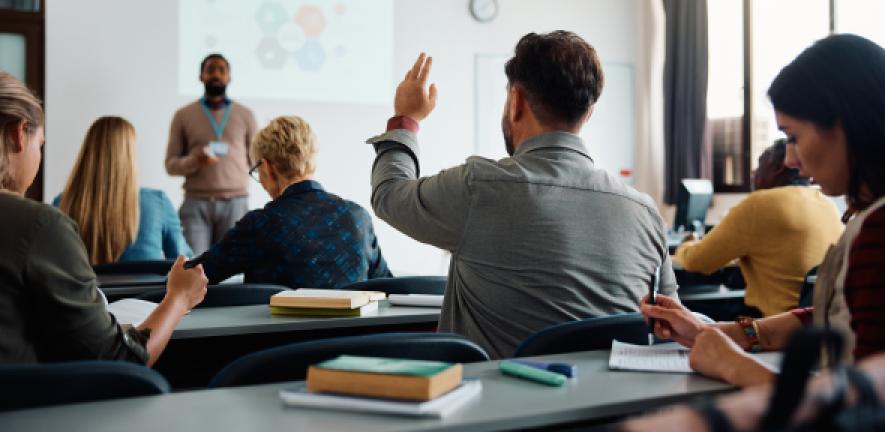
Isaac Newton Institute
This two-day training workshop aims to provide attendees with the skills to address the challenges involved in communicating mathematics to different audiences.
Background
Mathematical and data sciences are becoming ever more visible as a key tool in understanding and addressing societal issues. It is important that non-expert audiences are informed about advances in these areas. These audiences include not only other mathematicians and scientists, but also journalists, policy makers and the general public. It is therefore of great importance to reflect on both successful and unsuccessful forms of mathematical communication in order to develop better mechanisms to communicate effectively with different audiences.
One very notable example of the importance of mathematical communication was during the COVID-19 pandemic, where mathematical models of the spread of COVID-19 were regularly used to explain to the general public the reasoning behind various government intervention policies. Climate change and machine learning are other examples.
The Isaac Newton Institute and Newton Gateway realise that mathematics communication is hugely important and are keen to support training, in particular for Early Career Researchers as part of its support of graduate training in general. This training session will help participants gain skills that will help them to communicate their research and mathematics more broadly both verbally and in the written form.
Aims and Objectives
The event will provide attendees with guidance and advice on both writing and in-person presenting of mathematical research. We will consider the different audiences you might find yourself communicating to and have the opportunity to practice and develop the skills needed to communicate effectively.
Day 1: Writing
The focus of the first day is on the skills you need to write clearly and engagingly about your research. The ideas and practical advice covered are useful in all forms of written communication from job applications to writing newspaper articles for the mainstream media. Working interactively with other participants, you will distil from your research a topic to focus on, identify and then develop the story you want to tell. Practical exercises will give you an opportunity to work on crucial elements and the overall narrative of a piece that would be accessible to a broad, non-expert audience. This work would give you a good basis to build on during day two of the workshop.
Day 1 will:
-
Explore the principles of communication
-
Provide practical writing and editing tips
-
Include time for individual writing, as well as working interactively within groups to develop your piece
-
Challenge you to pitch your story to our newsroom!
Day 2: Speaking and Presenting
For the second day of the course, we’ll use some of the topics and ideas you developed on day 1 to consider how to speak to and engage an audience. Alongside some general tips on speaking and presenting, we’ll discuss the types of audiences you might find yourself presenting to, and how to deliver your content in an engaging and meaningful way, as well as using techniques from other types of performance to enhance your presentation.
Day 2 will:
-
Build on the foundation of understanding your audience
-
Develop your confidence in presenting and speaking
-
Include time to plan and develop content for engaging presentations, working in groups
-
Offer a chance to try out some presenting for feedback.
A provisional Programme will be available soon.
The training will be delivered by maths communicators Marianne Freiberger, Rachel Thomas, Ben Sparks and Katie Steckles.
Marianne Freiberger and Rachel Thomas are Editors of plus.maths.org, based at the University of Cambridge. They collaborate with researchers in mathematics and data science to communicate their work to a wide variety of audiences. In addition, they have co-authored and edited several popular maths books and worked as science editors on a documentary series for Discovery+. Previously, Marianne was a maths researcher and Rachel was a maths consultant working for government and industry.
Ben Sparks is a mathematician, musician, and public speaker. He gives maths talks and workshops around the world, to students, teachers, and the general public. He’s part freelance and part time with the Advanced Maths Support Programme (AMSP), and he’s based at the University of Bath.
Katie Steckles is a mathematician based in Manchester, who gives talks and workshops and writes about mathematics. She finished her PhD in 2011, and since then has talked about maths in schools and universities, at science and music festivals, on BBC radio and TV, as part of theatre shows, in books and on the internet.
Registration and Venue
Registration is open and the training is free of charge.
The training is primarily aimed at PhD students and Early Career Researchers based in Cambridge and those that are at the Isaac Newton Institute for one of the Programmes taking place on these dates in October 2024 and priority will be given to these participants, because of capacity.
If you are based elsewhere or have a different reason to want to attend, please send an email to the Gateway with your expression of interest which will be considered. This event is being run as an initial pilot and we hope to be able to deliver further events in the future.
The workshop will take place at the Isaac Newton Institute for Mathematical Sciences in Cambridge, United Kingdom. Please visit the Isaac Newton Institute website for further information about the venue.

